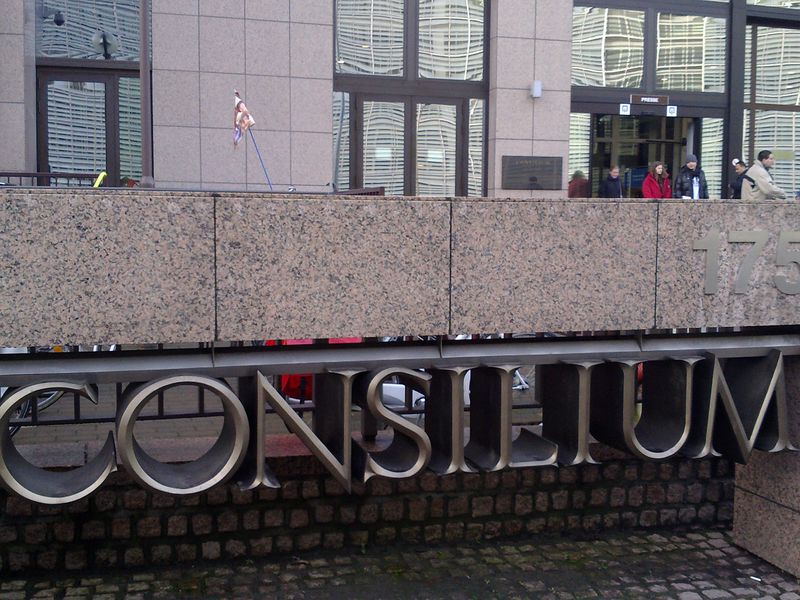Dobrodosla, Hrvatska!
Dessislava Dimitrova, December 11, 2011
 After successfully closing all negotiation chapters this summer, on Friday Croatia has officially signed its EU accession treaty, thus opening a new chapter in its history of an independent state. In the back light of the serious economic crisis and the even more serious debates on what the exit from it should be between some of the EU members, the signing of the accession treaty is a uniting event. Despite the vague future of the EU and the comments that Croatia’s entry into the bloc was like boarding Titanic just a few hours after it had hit the iceberg, both Croatian President Ivo Josipovic and Prime Minister Jadranka Kosor looked quite happy with their achievement.
After successfully closing all negotiation chapters this summer, on Friday Croatia has officially signed its EU accession treaty, thus opening a new chapter in its history of an independent state. In the back light of the serious economic crisis and the even more serious debates on what the exit from it should be between some of the EU members, the signing of the accession treaty is a uniting event. Despite the vague future of the EU and the comments that Croatia’s entry into the bloc was like boarding Titanic just a few hours after it had hit the iceberg, both Croatian President Ivo Josipovic and Prime Minister Jadranka Kosor looked quite happy with their achievement.
Kosor, for whom the signing ceremony was one of her last appearances in public, looked especially excited. During her 4-year mandate she managed to convince Brussels that her country was ready for membership, but lost the political battle with her local opponents and suffered a serious loss on the parliamentary elections on December 4.
Kosor did not spare any efforts to show that she could tackle the country’s biggest problem – corruption, but despite her success in this area the Croats' discontent,  boosted by the economic crisis, has been constantly growing in the last few months to such an extend that they preferred to choose a leftist government, which happens for a second time in the last 20 years.
boosted by the economic crisis, has been constantly growing in the last few months to such an extend that they preferred to choose a leftist government, which happens for a second time in the last 20 years.
Following the signing ceremony, Kosor remained in Brussels to attend for a first time the European Council as an observer. In the coming year and a half, during which all EU member states are to ratify the accession treaty, the observer role will pass on to the winner in the elections and a prime minister to be Zoran Milanovic.
In the meanwhile, he will have several quite difficult tasks before him. Just a day after the elections the international rating agency Fitch warned the new government that it should carry out fiscal consolidation and structural reforms in order to support growth, if it wanted its rating to remain unchanged. Besides, the rating’s outlook remains negative, reflecting the large budget deficit, the growing government debt and slow economic growth. According to the Fitch analysts, the downside risks to Croatia's rating will outweigh positive factors, including EU accession.
 According to the agency, the accession should be a long-term positive for Croatia because it will strengthen governance, unlock external financial sources, support FDI, and provide an anchor for fiscal policy. The new government, however, has not articulated a detailed fiscal and economic programme so far, excluding that it has pledged to cut the budget deficit to 3% of gross domestic product (GDP) and bring the ratio of the public debt to 60% of GDP.
According to the agency, the accession should be a long-term positive for Croatia because it will strengthen governance, unlock external financial sources, support FDI, and provide an anchor for fiscal policy. The new government, however, has not articulated a detailed fiscal and economic programme so far, excluding that it has pledged to cut the budget deficit to 3% of gross domestic product (GDP) and bring the ratio of the public debt to 60% of GDP.
 Bakir Izetbegovic, Andrej Plenkovic | © Council of the EU
Bakir Izetbegovic, Andrej Plenkovic | © Council of the EU Aleksandar Vucic, Recep Tayyip Erdogan | © Serbian Presidency
Aleksandar Vucic, Recep Tayyip Erdogan | © Serbian Presidency Jean-Claude Juncker, Zoran Zaev | © European Commission
Jean-Claude Juncker, Zoran Zaev | © European Commission Kolinda Grabar-Kitarovic | © KGK
Kolinda Grabar-Kitarovic | © KGK Jozo Rados | © European Parliament
Jozo Rados | © European Parliament Aleksandar Vucic, Andrej Plenkovic | © Vlada RH
Aleksandar Vucic, Andrej Plenkovic | © Vlada RH | © euinside
| © euinside